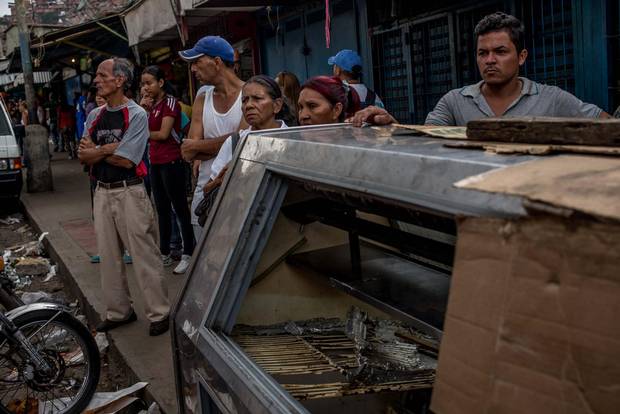Carmen Tovar remembers the apologies. The doctors who stood around the body of her 17-year-old daughter Nakarid told her they were so very sorry, but the girl had died, and so had the baby she was trying to deliver. We did all we could, the doctors told Ms. Tovar – we're terribly sorry.
Nakarid had high blood pressure all through her pregnancy, but the free clinic in their hillside slum on the edge of Caracas had no drugs to treat it, and her mother could not afford the wildly inflated prices in the private pharmacies. When Nakarid's contractions started, on the night of Dec. 7, Ms. Tovar took her to a nearby maternity clinic, but they were turned away: no beds available there. Same thing at the next clinic. By the time they reached the third, Ms. Tovar, 49, was out of money to pay another taxi, and her daughter was disoriented, dizzy with a shattering headache. Ms. Tovar demanded a bed, and that clinic reluctantly took Nakarid. But she died a few hours after they reached the hospital. The doctors said she had pre-eclampsia; they lacked even a basic intravenous line to treat her.
Ms. Tovar recognized the sympt oms because she had the condition herself, 24 years earlier, when her elder daughter was born. She remembers how doctors tucked pills under her tongue when the crushing pain gripped her own head, remembers a catheter, remembers electrodes taped to her chest.
"Those were other times, another Venezuela," Ms. Tovar says, her mouth a bitter line.
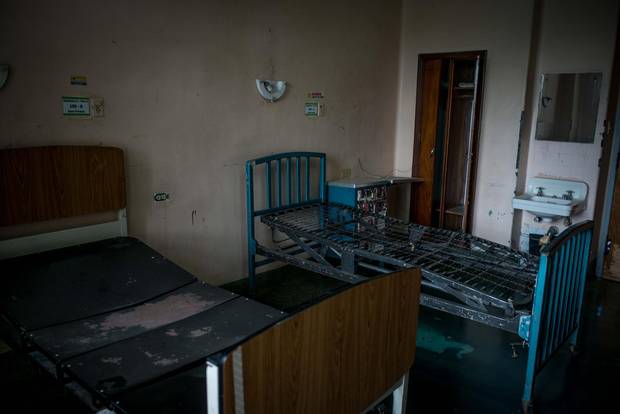
A two-bed room at Clinic University Hospital, unusable due the lack of cleaning supplies, bathrooms and mattresses.
These times, in Venezuela, are brutal ones: There are anti-government protests every day in cities across the country. At least 67 people, most of them under the age of 30, have been killed in clashes with the National Guard and colectivos, pro-government militia-like groups, since April 1, according to the Attorney General's office, and more than 1,000 others have been injured. At least 3,000 protesters have been arrested, and 360 have been taken before military tribunals, charged with "treason to the homeland," for which they face a maximum sentence of 30 years.
Protesters are demanding that President Nicolas Maduro step down and call new elections. They are incensed at the state of their country: The conditions in public hospitals, such as the one where Nakarid died, are medieval. Maternal mortality rose at least 65 per cent last year over the year before; child deaths are up at least 30 per cent since 2015, although doctors say the government is under-reporting. There is a resurgent epidemic of malaria, once nearly eliminated here, and children are dying of diphtheria, a disease not seen for two generations.
The shelves in government stores are bare; the prices in the black market resale stores are beyond the means of all but a small elite. A third of the population skips at least one meal a day, according to a national survey of living conditions by three public universities. So many people have punched new holes in the ends of their belts that it's like some strange fashion – the extra leather flaps loose in the front, or wraps twice around their waists.
Public security has deteriorated alongside living conditions. Caracas is the most violent city in the world, with a murder rate of 103 per 100,000 people – a rate 100 times higher than Toronto's – and Venezuela has the highest incidence of violent crime in South America, judging by official statistics, which are almost certainly an underestimation.
The economy is moribund: Many private businesses have shut down, unable to function because of currency controls and a lack of imported materials; others have been nationalized, but also lie idle without supplies. For Venezuelans who still have jobs, salaries are laughable. The minimum wage is 200,000 bolivars a month – or $28 (U.S.) at the black-market exchange rate – made up of 70,000 bolivars in cash and the rest in food-staple coupons. Low-income families qualify for a monthly batch of staples sold at fixed prices but, these days, that arrives weeks late or not at all (and, increasingly, only to people who participate in pro-government rallies or otherwise demonstrate their loyalty). In the survey on living conditions, nine of out 10 people said they did not earn enough to cover their family's food needs.
These conditions would be harsh anywhere, but there is a particular bitterness to them here – because everyone has a recollection similar to Ms. Tovar's. Venezuela was a functional and prosperous country in recent memory. People here know their nation has the world's largest proven oil reserves, great mineral wealth, vast agricultural potential. The hardships of daily life seem doubly painful to many Venezuelans, because they are so needless.
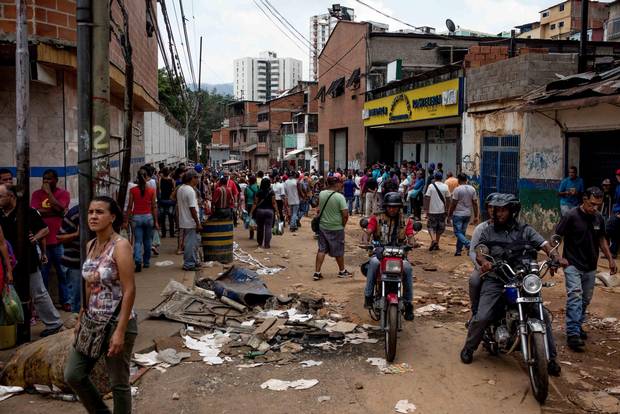
The morning after a night of looting in the El Valle neighborhood of west Caracas.
The salt in the wound is the rosy image put forth by Mr. Maduro. The President regularly appears on television celebrating the achievements of the "Bolivarian revolution" begun by his predecessor Hugo Chavez – or, on days with particularly large opposition demonstrations, he takes over the national airwaves to host a salsa music program. In an Orwellian declaration not long ago, he celebrated a reduction in obesity thanks to government health programs.
For those who remain to be persuaded, Mr. Maduro's government maintains a colectivo presence in low-income neighbourhoods to enforce the party line. Ms. Tovar kept her voice low as she described her bubbly daughter's agonizing death – unsure of who among her neighbours might be keeping tabs.
"I never imagined it, never in my life," she said a few days ago. "To think that we might be reduced to living like this."
Now she wonders how much worse life can possibly get – and how Venezuela might return to the country she remembers.
Far below Ms. Tovar's single-room cement block home, which clings to a hillside in a community called Junquito, the acrid blue-tinged haze of tear gas was building in the streets. Protesters in a middle-class neighbourhood of apartment blocks were pushing to occupy a highway leading downtown. Eighty per cent of Venezuelans say they want Mr. Maduro to leave office; these latest protests were sparked by an attempt by the Supreme Court, which he controls, to override Congress, where the opposition has a two-thirds majority.
The near-daily confrontations are a level of public pressure not seen here in 15 years; while previous opposition protests have relied on a middle- and upper-class base, some of the most raw displays of anger are now in lower-income areas, once the government's bastions of support.
Venezuela's opposition – a fractious coalition of groups opposed to the socialist regime that has ruled for 18 years – has managed to cobble together a sufficient degree of unity to sustain the protests. But, far from ceding to their demands, Mr. Maduro is doubling down. He announced in early May that he would convene an assembly in July to rewrite the constitution, in what seems a clear effort to concentrate more power in executive hands. He is devoid of the charisma of his predecessor Hugo Chavez, who chose him as his deathbed successor, but is demonstrating a greater willingness to defy international pressure and abandon democratic norms.
"The hardliners are more and more entrenched: You can conclude they are prepared to go to extraordinary lengths to stay in power," said a Western diplomat in Caracas who was not authorized to speak on the record. "I don't think we've seen the end of what the people around Maduro are willing to do. They view it as short-term pain for long-term gain. There is a new desperation, and I expect we will see more deaths."
The leadership is singularly focused on retaining power, said Nicmer Evans, a former adviser to Mr. Chavez who broke with his Socialist Party after the leader's death in 2013 – and while those in Mr. Maduro's inner circle may have some vestige of commitment to the Chavez "revolution," they likely have other motives, too. A core group of Chavistas, as they are still known, has grown immensely wealthy because of their access to hard currency and control over key businesses.
There are mammoth levels of corruption related to government contracts. A recent U.S. Justice Department settlement with the construction giant Odebrecht SA said that company alone paid $98-million (USD) in bribes to government officials for public works jobs between 2006 and 2015. The U.S. government also ties many senior figures to narco-trafficking, including two of Mr. Maduro's nephews by marriage, who were convicted by a U.S. court last year of conspiring to transport cocaine.
Meanwhile, Venezuela's leadership is increasingly isolated. The United States has frozen the assets of senior government figures, including eight Supreme Court justices involved in the attempt to subvert Congress. (Although the government accuses the United States of waging "economic warfare" on Venezuela, the country is nevertheless a favourite destination for the Chavista leadership's college-going children and their forex bank accounts.) As Mr. Maduro and his inner circle deepen repression, they also raise the chance they could face prosecution at a body such as the Inter-American Court of Human Rights.
Mr. Evans said he believes Mr. Maduro is attempting to dispense with the legislature because he wants to be able to borrow more money internationally, without Congressional approval that is presently required. Venezuela's external debt is at least $117-billion (USD). The government's foreign exchange reserves are near empty. Oil exports keep precious dollars coming, but production at Petroleos de Venezuela SA(PDVSA), the national oil company, has been falling steadily for years. Oil earnings cannot bankroll both the government's foreign debt payments and the network of social programs that Mr. Maduro relies on to buy support.
It's hard to find anyone, even in neighbourhoods where pictures of "El Comandante" Chavez adorn the walls, who still believes that a foreign conspiracy is to blame. The question is how much they can do about it.

Two protesters get ready moments before clashing with Venezuelan security forces in Caracas.
Carmen Tovar warned Nakarid against having sex. Don't fool around with that boyfriend of yours, she'd say. Her admonishments were part Catholic morality, and part cold pragmatism. All around them, girls were getting pregnant: no surprise, since the IUDs and Depo-Provera injections they once relied on disappeared a few years ago. Condoms sell for 7,000 bolivars for a box of three these days – more than Ms. Tovar earns in a day of cleaning houses down in the middle-class neighbourhoods.
As with teenagers everywhere, Nakarid ignored her mom. Her boyfriend disappeared when he heard she was pregnant. And Ms. Tovar was left with nothing to do but hope. She had no illusions about the medical system: She has high blood pressure, and she knows there have been no medications available in the government pharmacies that theoretically supply the poor, not for years. Back when Nakarid found out she was pregnant, the government was refusing to release health statistics, but Ms. Tovar didn't need their figures: Everyone knew women were dying having babies.
When Mr. Chavez was first elected, nearly two decades ago, Venezuela had some of the best public health indicators in Latin America. That reflected decades of steady progress: In 1958, at the start of the democratic era, 140 of every 100,000 women died giving birth, but the figure had fallen to 68 women by 1990. When the government finally released 2016 data a few weeks ago, the figure was back up to 112 per 100,000 women. "The health system is so deteriorated that we're going back in time," said Rafael Orihuela, who was the minister responsible for public health in the last government before Mr. Chavez swept to power.
"What do I have when I go to deliver a baby? Only a pair of gloves and maybe a clamp for the cord," said David Flora, who recently completed a two-year stint as the sole doctor in a referral hospital in Rio Chico, a town three hours' drive west of Caracas. "If the placenta doesn't descend, if I need to stop bleeding, if the baby has respiratory distress – I have no way to attend that. I have one bed and a pair of gloves and a line of women waiting at the door to deliver. Women arrive at 40 weeks pregnant with no file, they have had no prenatal care, and I know nothing about them. I don't even know how many babies are in that belly because they haven't had an ultrasound. I don't even have a fetoscope to listen, so I don't know the size of the pelvis, the size of the baby, if the baby is even alive. If the mother needs a caesarean, she dies."
These days, Dr. Flora works in internal medicine at the Central University Hospital in Caracas. It's the country's premier medical institution. His desk is stacked with charts for patients with cancer, kidney failure, diabetes. The hospital has no dialysis, no chemotherapy, no functioning X-ray machine, no strips to test for sugar levels. Dr. Flora, almost manic in his frustration, flings open the doors of the wards, row after row of which are empty. The plumbing gave out months ago and there are no parts to fix it. The operating theatre functions when it receives an infrequent delivery of supplies from the health ministry, or when a patient has family members who manage to track down every single thing, from scalpel to gauze, that an operation will require, and can pay for it themselves.
There is, in short, very little for Dr. Flora to do, in terms of the medicine he was taught to practise. "I have no way to bring these patients back – so I can console. Be there at the moment that they die. That's what I can do."
When Dr. Orihuela, the former minister, talks about Venezuela moving back in time as it loses hard-won gains in public health, he is correct about the worsening indicators. But his claim that pre-Chavez Venezuela had excellent and universal public health is not incontrovertible. This has historically been one of the world's most unequal countries. Mr. Chavez was elected in a landslide because, while Venezuela had been one of the world's largest oil producers for decades, wealth stayed concentrated in the hands of a small elite. He used the income from oil prices over $100 a barrel to take free primary health care into the country's most marginalized communities, often relying on Cuban doctors whose work Havana swapped for oil. Nakarid Tovar saw a Cuban doctor at one of these clinics for her prenatal care. But he had no medication for her either: The slum clinics are in no better shape than the hospitals these days.
The legacy of Mr. Chavez's economic redistribution schemes underlies the food shortage as well. Thanks to nationalizations, price and currency controls, Venezuela no longer imports enough food, nor grows it. For most people, that means the question of what they will eat is the consuming preoccupation of most of their waking hours.
Yanis Montilla, 34, moved to Caracas with his wife from the countryside eight years ago. Back then, the city held the promise of prosperity. "There were a lot of jobs and the supermarket shelves were full of many things," he said. But last December, the construction company he was working for shut down for lack of materials. Since then, he earns about 30,000 bolivars, a couple of times a week, doing odd jobs such as cutting grass; it's enough to pay for two simple meals a day.
His nine-year-old-daughter Yanise has hip and collarbones that jut through her thin cotton clothes. One day a week, Mr. Montilla and his wife Isgleidy each spend the day in line, hoping there will be something left in the price-controlled market by the time they get in the door. (Everyone is allotted a day of store access based on the numbers in their national ID card.) A typical shift of standing in line runs six to eight hours. Mr. Montilla's shoulders slumped just describing it. Back when he was working, they could skip it some times, and buy essentials at the resellers, where people with connections to government resell staples at prices marked up more than 100 times. "We don't have money for that any more." Now, they rely on beans and tubers that relatives in the country give them, and on bananas they can grow on a little patch outside their door of their small hillside house.
Mr. Montilla blames Mr. Maduro for the mess of things, but he has not joined the demonstrations. For one thing, any time that he isn't waiting in a line for food, he is scrounging for work. For another, he's afraid. "It used to be that demonstrations were peaceful. These days you go out and you don't know if you'll come back."
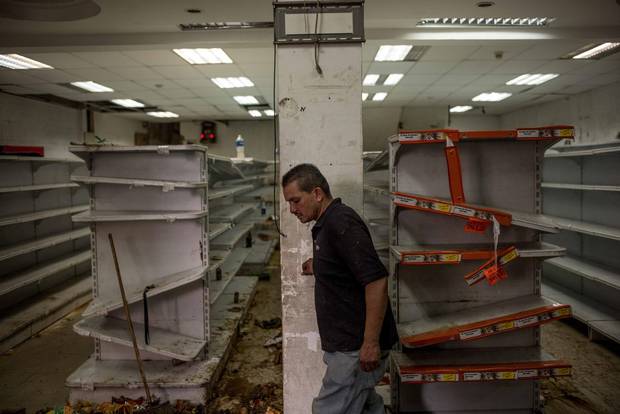
A man walks inside a looted supermarket in El Valle in west Caracas.
Venezuelan protesters are dying from wounds sustained from tear-gas canisters fired at point blank range, from metal-tipped marbles, rubber bullets, and live ammunition. (Four National Guard officers have also died; one retired police officer and one pro-government agent were murdered by mobs of anti-government protesters.)
Alfredo Romero, the director of a network of human rights lawyers called Foro Penal who have been working to try to get protesters out of jail, said nearly everyone they defend reports torture in prison, and security forces have started arresting people from their homes in the night. But the government nevertheless feels it needs to use further repressive measures. "It's not as effective as it was before – that's why they are using the killings, in order to intimidate people even more," he said.
The violence is deterring some people, such as Mr. Montilla, but it is also calling international attention. This may explain why the opposition leadership has not corralled the slingshot-wielding students who face off against the heavily armed government troops, nor insisted on peaceful demonstrations: wounded, teargassed teenagers make for good footage.
One key reason Mr. Maduro has held on this long is the character of his opponents. The opposition coalition, the Democratic Unity Roundtable, is made up of a number of parties whose political orientations range from neoliberal to social democratic. They have historically had trouble uniting and even now struggle to convince those who once supported Mr. Chavez that they are concerned about them. "The opposition has done nothing to speak to their issues or mobilize the popular class," said David Smilde, who teaches Latin American politics at Tulane University in New Orleans and who has lived here in Caracas for much of the past 25 years. They don't go to poor areas, and they haven't put forward a clear message about what a transition after Mr. Maduro would look like, he said.
And while life has become more difficult for nearly all Venezuelans in recent years, difficult is still a matter of degrees: Upscale neighbourhoods of Caracas are full of restaurants where a salad costs a week's minimum wage. For people with access to hard currency, from relatives abroad or their jobs, luxuries – chic handbags, Prosecco, facelifts – are absurdly cheap. Women in gold wedge heels and giant sunglasses step out of chauffered SUVs, their gaze sliding past families foraging in dumpsters. Inside the French bistros painted in three shades of white, waiters apologize that only four of 10 menu options are available.
But there are tentative signs of a change: A few senior political figures have begun to distance themselves from Mr. Maduro – most notably the Attorney General, Luisa Ortega, a veteran Chavista who over the past six weeks has made a series of increasingly sharp criticisms of Mr. Maduro and on Thursday openly broke with the government. Holding a copy of the nation's constitution in her hands on the steps of the Supreme Court, she called on its judges to cancel plans to rewrite the document, and for voters to oppose the change. "What's at play here is the country," she said. "The integrity of Venezuelans." Mr. Maduro has not fired her yet, which suggests she is not alone in her views. Two Supreme Court justices and a former general have also publicly criticized the President in recent days.
To encourage other senior figures to abandon the government, the opposition would need to hold out welcoming arms, Mr. Evans, the former Chavez adviser, said; instead, they reiterate that, once they take power, they will prosecute anyone in the current regime for corruption and human rights abuses.
The opposition's chief hope is that the Maduro regime finally will go completely broke. When the food runs out entirely, the thinking goes, the streets will fill and people won't go home until he leaves. As with so much in Venezuela's history, that equation seems to hinge on oil. Production is now two million barrels a day, down from 2.6 million in 2015.
"The only way to stop the decline would be investment and there are no resources for this: It will keep falling," said Rafael Quiroz, the chief adviser on the oil industry at the country's central bank. "And even $60 a barrel wouldn't give them what they need."
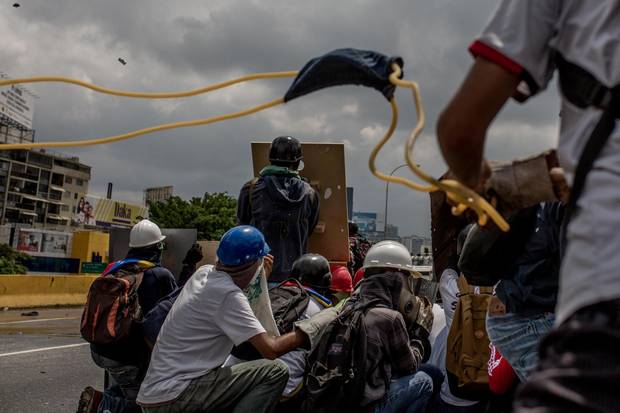
Protesters use an improvised slingshot to attack Venezuelan security forces during a protest against Venezuelan President Nicolas Maduro.
Mr. Maduro, however, still has some friends. In mid-May, Goldman Sachs bought $2.8-billion in 2014 bonds issued by Petroleos de Venezuela that had been held by the central bank. The steeply discounted bonds are a star performer in emerging-market funds, since a change in government could bring a payout at twice the purchase price. "Many people on both sides overestimate their ability to obliterate the other side," Prof. Smilde of Tulane said. "The opposition forgets that the government has most of the institutions, guns and money. People in government think: 'We can push through the [constitutional rewrite] – our real problem is the threat of being pushed out, and we can end that.' And so you don't see dialogue or negotiation."
On the morning of May 3, Armando Cañizales filled out the registration paperwork for medical school. Then he gathered his gear: a respirator, for defence against tear gas, plus a plywood shield, and work gloves for lobbing back tear gas and Molotov cocktails – the uniform of the young men and women who march at the front of the demonstrations, directly confronting the National Guard. His mother, Monica Carrillo, a pediatrician, was worried, but he had turned 18 a few weeks before, so she could hardly forbid him; and, anyway, she didn't feel it was right to ask him not to go. "I had the chance to live my dreams as a young person – how could I stop him from fighting for the chance to live his?"
A couple of hours into that protest, Armando suddenly slumped to the ground. Blood bloomed across his yellow T-shirt. His older brother, Alejandro, who was marching beside him, and a couple of friends scooped him up; they flagged one of the rescue motorbikes that patrol the sides of the protests, and Alejandro wedged his younger brother's limp body between himself and the driver as they rushed to an ambulance.
By the time Dr. Carrillo got to the hospital, her son was dead. In the morgue, they raised the sheet just far enough for her to see Armando's face, but she pulled it down further. "It went in there, right at the artery," she said, lifting her fingers to a spot just above her collarbone, to show the place where the projectile that killed her son entered his neck.
After his death, the government said Armando was hit by ammunition fired from the opposition side at the National Guard. Opposition leaders have blamed the shooting of protesters on security forces and members of colectivos who mingle with the government troops in the confrontations. Dr. Carrillo says a team sent by the prosecutor, Ms. Ortega, met with her family and promised a full investigation.
Dr. Carillo and her husband had talked for years about sending their boys out of Venezuela, to relatives who had already sought refuge elsewhere. Alejandro said he would go. Armando said no way. "He used to say, I will drive you to the airport – but I'm staying here." Armando played football, danced salsa, took English class on weekends, and was a gifted violinist. Now his parents have forbidden Alejandro to march; instead he paints shields for the protesters, in the red-blue-and-yellow of Venezuela's flag, each with a treble clef in memory of his brother.
When they had to choose a tombstone for Armando, Dr. Carrillo rejected the usual Bible verses. Instead, she had the stone engraved with the message her son kept on the screen of the cellphone they returned to her in the hospital morgue.
Prohibido rendirse: solo respira profundo y continua. You can't give up: Just take a deep breath, and push on.
